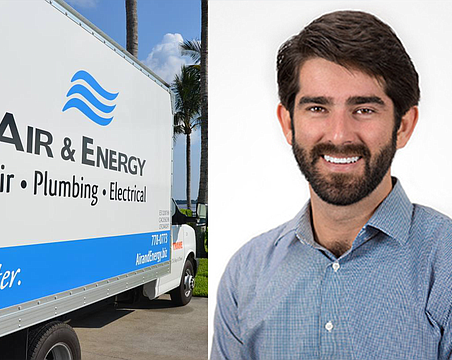Bank Shots
Two former colleagues go at it over who may have betrayed Colonial Bank.
By Francis X. Gilpin
Associate Editor
Anthony F. Gonzalez is a whistleblower who was kicked off the local board of Colonial Bank for trying to protect the shareholders of its parent company.
No, says Joseph V. Chillura, Colonial's chief executive in Tampa. Gonzalez was fired for helping a Colonial competitor set up shop in the bank's own backyard.
Chillura says Gonzalez went so far as to recruit local Colonial executives to join a St. Petersburg bank's push across the bay into Hillsborough County. How does Chillura know that? The Colonial Bank Tampa Bay CEO says he was one of those Gonzalez asked to defect with him to the Bank of St. Petersburg.
Their disagreement has landed in the courts, with both sides hunkered down for a long fight. Gonzalez, who was a local criminal defense attorney for more than 30 years, is pitted against Chillura, whose father has a public square named after him in downtown Tampa.
The year-old litigation has taken on aspects of a legal brawl, as each side maneuvers before state, federal district and administrative law judges.
Chillura says he rebuffed the Bank of St. Petersburg and eventually fired Gonzalez. Since then, "Gonzalez has exhibited his personal animosity and vindictiveness toward Chillura," Colonial attorney Karen Meyer Buesing of Tampa's Zinobar & McCrea PA says in a legal brief. At one point, an irate Gonzalez proclaimed himself "the ultimate terrorist" and vowed to "bring [me] down," Chillura has stated under oath.
But Gonzalez says he only warned Chillura away from the influence of Colonial Tampa Bay President Alfred T. Rogers. "I talked to Joe and I consistently told him I thought that on the day-to-day basis that the advice Al was giving him ... was incorrect and not right," Gonzalez said at a January deposition.
Nobody's savings are at risk here, except maybe in the bank accounts of the parties footing the legal bills. But the hail of charges and countercharges is exposing a side of Gulf Coast banking that depositors rarely see.
Helping each other
The 59-year-old Gonzalez eased from the law into banking by co-founding Manufacturers Bank of Florida in the 1970s. Colonial BancGroup Inc. bought the Tampa bank in 2001 for $56 million. Colonial has been snapping up banks in Florida, where some believe the Montgomery, Ala.-based company will move its headquarters someday.
Manufacturers BancShares Inc. was chaired by Gonzalez. Young Chillura, now 38, son of former Hillsborough Commissioner Joe Chillura, was chief operating officer of the Tampa bank. Manufacturers catered to the city's Latin community. The Alabamans kept Latin executives and others around so Manufacturers customers would stay with Colonial. Gonzalez was appointed to a Bay area advisory board while Chillura was named a senior executive vice president at Colonial.
Before their falling out, each man helped the other get a promotion and better compensation within the local Colonial hierarchy.
In 2002, Gonzalez says he talked up Chillura for the Bay area CEO's job with Robert E. Lowder, Colonial BancGroup's chairman, president and CEO. The men were flying to Miami for a Colonial branch opening aboard the company airplane. Chillura ended up with the CEO job and a nearly 14% pay raise to $190,000 annually.
In April of the same year, Chillura got Colonial to put Gonzalez on the payroll at $100,000 a year to drum up business for the bank. At the same time, Gonzalez assumed the vice chairmanship of the advisory board and subsequently became chair.
Chillura says he told Gonzalez that the rainmaking duties would be similar to what a venerable Orlando attorney and banker, Donald T. Senterfitt, did for Colonial in Orange County.
On Oct. 25, 2002, Colonial's non-compete agreements with some of the holdovers from Manufacturers Bank expired. For perhaps as long as six months before then, Colonial claims Gonzalez and fellow advisory board member Luciano L. Prida Jr. were in secret talks with Tampa insurance executive Robert Rothman about investing in the Bank of St. Petersburg.
Rothman's Black Diamond Financial Group Inc. bought control of the tiny St. Petersburg bank for $11 million in 2001. As of last year, the Bank of St. Petersburg's two offices held less than one-half of 1% of the bank deposits in Pinellas County.
Later in 2002, Gonzalez and Prida disclosed their plans to Chillura and Rogers. Gonzalez and Prida related that they were obtaining a voting trust to control the Bank of St. Petersburg and asked Chillura and Rogers to come work for them.
"They said they wanted Chillura and Rogers to provide the actual banking work expertise, experience and effort to make the Bank of St. Petersburg as successful as Manufacturers had been," Colonial stated in a federal court filing.
Chillura declined the invitation. He claims to have questioned Gonzalez about the propriety of negotiating with Rothman while taking a Colonial paycheck. Gonzalez replied that he was no more conflicted than Chillura. Rogers and Chillura had set up a finance company shortly after the Manufacturers merger that theoretically competed with Colonial.
In February 2003, Chillura agreed to meet with Rothman at the insistence of Gonzalez and Prida, Tampa's former city auditor. Rothman, who owns a piece of the Washington Redskins football team, couldn't change Chillura's mind.
Competition from inside
Meanwhile, up in Alabama, Colonial BancGroup Chairman Lowder was hearing that a few of his top Tampa people might go into business against him. Lowder couldn't have been reassured when Gonzalez asked about letting Rogers out of a non-compete pact.
For, according to Colonial, Gonzalez had decided that Chillura should stay where he was. Gonzalez wanted to hold onto his $100,000 Colonial salary, the bank says, while Rogers would go on ahead and get the Bank of St. Petersburg up and humming.
The problem with that change in plan was Rogers. Gonzalez had discussed with Lowder voiding the non-compete for Rogers without bothering to tell Rogers, Colonial now says. Rogers emphatically rejected the Bank of St. Petersburg's overture, according to Colonial, vowing that "he would not work with Gonzalez again if his life depended on it, or words to that effect."
That did not set well with Gonzalez. He and Chillura attended a Miami boat show together in February 2003. Afterward, at dinner in front of Chillura's family, "Gonzalez went on a verbal rampage about how he was going to get Rogers fired," according to a Colonial court filing.
Tampa attorney William F. Jung of Jung and Sisco PA, who represents Chillura and Rogers, declined comment on the litigation.
Prida quit Colonial's Bay area advisory board the next month. Yet Lowder and Colonial Chief Financial Officer W. Flake Oakley gave Prida a $75,000-a-year consulting contract. The agreement barred Prida from holding more than a 1% interest in a Colonial competitor. Prida was already consulting for the Bank of St. Petersburg, according to Colonial. Prida couldn't be contacted by GCBR.
In April of last year, Oakley came to Tampa to sew up Chillura and quiet the rumors that Lowder was picking up back in Montgomery. Chillura agreed to a contract extension at $220,000 a year. Oakley also let Chillura decide the fate of Rogers, whom Gonzalez and Prida were trying to oust.
On Good Friday 2003, things came to a head. High above downtown Tampa at a University Club lunch, Gonzalez and Prida urged Lowder, Oakley and Colonial Chief Credit Officer Caryn Cope to can Rogers. Lowder deferred to Chillura. With Chillura present, Gonzalez issued an ultimatum: "If Al Rogers stays, I go."
Chillura had a choice to make. He viewed Rogers as a hard worker and essential to Colonial's future success in Tampa. Gonzalez was another story.
Although Chillura appreciated Gonzalez going to bat for him with Lowder regarding the CEO post, Chillura thought Gonzalez spent more time relaxing on Longboat Key than rustling up new business for Colonial in Tampa. To Chillura, it had become routine for Gonzalez to end their conversations with: "I'll be in Longboat if you need me."
Gonzalez takes exception to this dim view of his contribution to Colonial. He says Lowder should know better and supplied written documentation for the court record.
In 2002, Lowder sent Gonzalez an internal memorandum summing up prior discussions about how Colonial could acquire The Bank of Tampa. The two men agreed Hillsborough's biggest locally owned bank, with assets of $523 million at the time, wasn't worth more than $100 million.
Lowder suggested carving out $5 million from the starting price for Bank of Tampa President A. Gerald Divers, who routinely gets offers from mega-banks to sell out. Lowder concluded the memo by instructing Gonzalez to arrange a meeting with Divers.
Divers told GCBR that he doesn't recall discussing any acquisition proposal while Gonzalez was with Colonial.
Gonzalez says he also escorted Lowder on trips south when the chairman wanted to see how Colonial could expand in Sarasota and lend more money for development on Siesta Key.
Rogers wins out
Nevertheless, following an Easter weekend of contemplation, Chillura called Lowder the following Monday. Chillura would sever Colonial's ties to Gonzalez and cancel Prida's consultancy.
Colonial says Chillura considered the parting with Gonzalez a mutual decision due to the ultimatum at the University Club. But the bank says Gonzalez refused to assist Chillura with a transition. When the two men finally got together on the telephone, according to a Colonial court filing, "Gonzalez hurled a litany of insults at Chillura."
During a 90-minute phone conversation, the bank says Gonzalez described himself as "the ultimate terrorist" and promised Chillura that he would "bring you down." Gonzalez told Chillura that his dismissal looked like retaliation to him. Gonzalez accused Chillura of canning him because Gonzalez had brought up MCapital II LLC, the finance company that Chillura and Rogers started.
Chillura went ahead with an announcement of the departure of Gonzalez and Prida. The day before a local Colonial loan committee meeting, Chillura and Rogers met to prepare a press release with Harry Costello, head of public relations consultant Hill & Knowlton Inc.'s Tampa office. After hearing the circumstances, Costello advised Chillura to tell Lowder about MCapital II as soon as possible.
M.G. "Manny" Alvarez Jr., another ex-Manufacturers director, had been told to chair the next day's 9 a.m. loan meeting, in place of the supposedly departed Gonzalez. To the surprise of attendees, however, a late-arriving Gonzalez ran the meeting.
Chillura showed up even later and, wishing to avoid a scene, let Gonzalez finish instead of Alvarez, the husband of Tampa City Councilwoman Mary Alvarez. Upon adjournment, Gonzalez managed to get out the door before Chillura could corner him.
There wasn't much else Chillura could do because he had an 11 a.m. flight to Alabama. Landing in Mobile, Chillura joined Lowder and Cope for the second leg of his flight to Colonial's Montgomery headquarters. For the first time, Chillura revealed the existence of MCapital II to his Colonial bosses.
Chillura told Lowder that he and Rogers had set up MCapital II in 2002 to finance an old Manufacturers customer who did not meet Colonial's more conservative underwriting standards.
The timing of his disclosure was fortuitous. Hours later, Gonzalez faxed a letter to Lowder and Oakley in which Colonial says he feigned ignorance that he already had been discharged.
"Lou was fired and I will be also," Gonzalez wrote, mentioning Prida's plight, "because we 'blew the whistle' on a situation involving Joe and Al to the possible detriment of the bank."
Up to that time, Gonzalez contends Chillura had just discussed a voluntary retirement and not termination.
Gonzalez says he warned Chillura months before to close MCapital II, or face possible scrutiny from the federal Securities and Exchange Commission. Gonzalez recalls telling Chillura over lunch in January 2003 at the Columbia restaurant in Ybor City: "This is SEC stuff. This ain't little branch banking stuff that goes on among friends."
But Gonzalez says he was disappointed when Chillura let Rogers derail a proposed sale of MCapital II. "I felt that the shareholders were being, you know, cheated," Gonzalez testified at his deposition.
Colonial challenges Gonzalez's self-portrait as a whistleblower. MCapital II was formed with the knowledge of Gonzalez and Prida, the bank says. In fact, the company operated from certified public accountant Prida's office and Gonzalez sought a participation in one of the company's loans, Chillura says.
Chillura argued that MCapital II wasn't in direct competition with Colonial because his company's credit terms were easier. Still, on that May 8, 2003, flight, Chillura told Lowder that he would pull the plug on MCapital II.
Call the lawyers
Last July, Gonzalez filed an administrative complaint with the U.S. Department of Labor under the Sarbanes-Oxley Act as well as lawsuits in state and federal court in Tampa against Colonial, Chillura, Rogers and MCapital II.
Among other allegations, Gonzalez contends Chillura punished him for alerting Colonial to the harm that MCapital II could cause to holders of the parent company's shares, which trade on the New York Stock Exchange.
Gonzalez's federal suit seeks damages, including $100,000 a year until his retirement or Colonial is sold, plus $30,000 in additional benefits such as an expense account and memberships to unspecified organizations on Longboat Key and in Avila, an exclusive north Hillsborough subdivision.
In the wake of publicity about Gonzalez's lawsuits, Lowder had to calm Colonial's Bay area advisory board. During a conference call last summer, Lowder told local directors that Gonzalez and Prida had been treated fairly.
"The case will not be tried in the newspaper," Lowder was quoted in the board meeting minutes. "Even though there may be a couple of more such articles, the public will forget quickly. They will not remember the name of the bank in a very short time."
Since then, though, the Bank of St. Petersburg has gained some recognition in Tampa. Last fall, Chillura came into possession of a private placement memorandum for the Bank of St. Petersburg's holding company. (See "Colonial Battle," GCBR, Dec. 12-18, 2003.) The offering circular identified Gonzalez as vice chairman of Bank of St. Petersburg Holdings Inc. and chairman of the 20-year-old bank.
Their names notwithstanding, the holding company is now based in Tampa and the Bank of St. Petersburg has opened a downtown Tampa office. Another branch has opened in the Latin enclave of West Tampa.
The expansion is taking a toll on the $116 million-asset bank, even with the capital infusion from new investors. The Bank of St. Petersburg posted a $455,000 net loss for the first quarter of 2004. It reported a $109,000 profit for the same period a year ago.
In spite of the Bank of St. Petersburg's operating losses, Gonzalez appears determined to build another financial institution focused on the needs of, among other customers, the Latin neighborhoods of Tampa.
The city's mayor, Pam Iorio, stood between Gonzalez and Rothman last month as she snipped the ribbon at the Bank of St. Petersburg's second Hillsborough office on North Himes Avenue. More than 500 well-wishers attended a party celebrating the grand opening.





